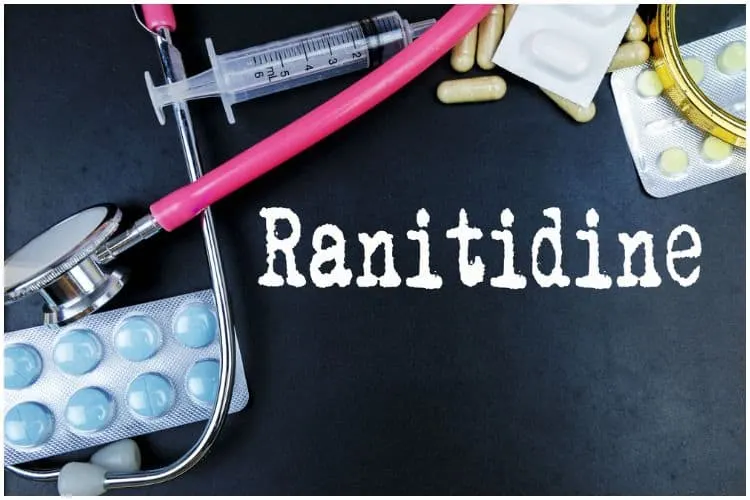Compare Famotidine vs Ranitidine:
Introduction
Acid reflux is a common health complaint that occurs when some of the acidic stomach contents go back up into the esophagus – the tube which connects the throat to the stomach.
More than 60 million people in the United States experience acid reflux at least once a month.
If you experience it more than twice a week, you may have GERD (gastroesophageal reflux disease).
Causes
Acid reflux occurs when a ring of muscle (the lower esophageal sphincter) at the bottom of the esophagus doesn’t function correctly.
Factors that have been shown to contribute to the condition include:
- citrus fruits;
- tomato-based foods;
- fried, fatty, and spicy foods;
- obesity (extra pounds can put pressure on the lower esophageal sphincter);
- drugs like calcium channel blockers, antihistamines, theophylline, and nitrates;
- pregnancy;
- eating before bedtime;
- eating large meals;
- alcohol or caffeine intake;
- smoking tobacco;
- hiatal hernia.
Symptoms
Heartburn is the most frequent of the acid reflux symptoms. Other symptoms include:
- hoarseness;
- bitter or sour taste in the mouth;
- wheezing;
- trouble swallowing;
- chronic dry cough.
Treatment
To ease the symptoms, your doctor may recommend over-the-counter or prescription medications which reduce how much acid your stomach makes, like:
- proton pump inhibitors;
- antacids;
- mucosal protectants;
- H2-receptor blockers.
Here is a comparison between famotidine and ranitidine, two medications that are used for the treatment of acid reflux:
Famotidine
It belongs to a family of medications called H2 antagonists which block the production of acid by acid-producing cells in the stomach.
It is sold under the trade names – Pepcid, Heartburn Relief, and Acid Reducer.
Ranitidine
This medicine is used to reduce the amount of acid produced in the stomach.
It is a type of medicine called H2 blocker or H2 receptor antagonist.
Uses
Famotidine is used to treat:
- Zollinger-Ellison syndrome;
- gastroesophageal reflux disease;
- stomach and duodenal ulcers.
Ranitidine is used to:
- prevent inhalation of acid from the stomach in pregnant women during labor;
- prevent recurrent bleeding from peptic ulcers;
- treat peptic ulcers;
- prevent inhalation of acid from the stomach while under general anesthetic during a medical surgery;
- prevent bleeding from stress ulceration in patients who are critically ill;
- treat chronic indigestion related to meals or which disturbs sleep;
- treat gastro-oesophageal reflux disease, including long-term management of healed oesophagitis, and relieve heartburn;
- treat peptic ulcers in patients taking NSAIDs.
Mechanism of Action
Famotidine works by inhibiting the action of histamine on the cells, hence, reducing the production of acid.
Ranitidine works by blocking the H2 receptors, which stops the cells from producing too much stomach acid.
The effect of this medicine can be observed after 60 minutes of administration. Its effects last for about 12 hours.
Side Effects
Possible side effects of famotidine include:
- vomiting;
- constipation;
- hallucinations;
- confusion;
- diarrhea;
- yellowing of the skin or eyes (jaundice);
- fatigue;
- visual changes;
- headache;
- irregular heartbeat;
- insomnia;
- depression;
- muscle pain;
- rash;
- nausea;
- hair loss;
- easy bruising;
- anemia.
Possible side effects of ranitidine include:
- diarrhea;
- headache;
- muscle pain;
- dizziness;
- gynecomastia;
- vomiting;
- difficulty breathing;
- nausea;
- mental confusion;
- stomach pain.
Dosage
The usual recommended dose of famotidine is 40 mg orally once a day.
The usual recommended dose of ranitidine is 150 mg orally 2 times a day, after the evening meal or at bedtime.
Warnings & Precautions
Famotidine
- do not take the medicine for longer than 14 days unless your doctor tells you that you should;
- do not take more than two capsules, tablets, or chewable tablets in a 24-hour period.
Ranitidine
Before taking this H2 receptor antagonist, you should tell your doctor if you have or have ever had:
- liver disease;
- porphyria;
- kidney disease;
- phenylketonuria.
Drug Interactions
Famotidine may interact in a negative way with the following medications:
- albuterol;
- ciprofloxacin;
- Cymbalta (duloxetine);
- ibuprofen.
Ranitidine may interact in a negative way with the following medications:
- diazepam;
- atazanavir;
- pazopanib (a selective multi-targeted receptor tyrosine kinase inhibitor);
- dasatinib;
- phenytoin;
- delavirdine;
- Mylanta;
- raltegravir;
- procainamide;
- gefitinib (a drug used for certain breast and lung cancers);
- theophylline.
Alcohol
Avoid consuming alcohol while taking these medicines, as it may be damaging to your stomach.
Is It Safe During Pregnancy or Breastfeeding?
Studies have found that these medicines are secreted into breast milk. Discuss with your doctor before using them if you are breastfeeding a baby.
There are no adequate studies of the drugs in pregnant women. Discuss with your doctor before using them if you are pregnant.
ALSO READ: Doxylamine Succinate vs Diphenhydramine HCL
Bottom Line – Famotidine vs Ranitidine
Famotidine is a histamine-2 blocker that is used to treat and prevent ulcers in the stomach and intestines. It works by decreasing the amount of acid the stomach produces.
Ranitidine is an H2-antagonist that is used to treat gastroesophageal reflux disease, Zollinger-Ellison Syndrome, and duodenal ulcers.
It works by blocking the production of acid by acid-producing cells in the stomach.
According to a 2013 study, famotidine is more effective at reducing gastric acid secretion than ranitidine.
Also, a 1991 study done at the Gastrointestinal Unit, L. Sacco Hospital, Milan, Italy, established that the efficacy of 20 mg famotidine is comparable to that of ranitidine in preventing duodenal ulcer recurrence.
Another 2011 study conducted by the Pediatric Gastroenterology Department, Shiraz, Iran, concluded that both medicines have equal effects in the treatment of functional dyspepsia.
ALSO READ: Mupirocin vs Neosporin
How to Prevent Acid Reflux and Heartburn
Effective prevention methods include:
- avoid tea, coffee, and soda that contain caffeine, as this stimulant aggravates acid reflux;
- avoid tight-fitting clothing as they may put pressure on the lower esophageal sphincter and abdomen;
- eat smaller meals – large meals fill the stomach and put pressure on the lower esophageal sphincter;
- avoid alcoholic drinks intake because alcohol stimulates the stomach to produce more acid and relaxes the valve between the food pipe and the stomach;
- don’t drink carbonated beverages as they make you burp;
- elevate the head of your bed;
- lose weight if you are obese or overweight since extra stomach fat places unnecessary pressure on your abdomen.
ALSO READ: Ofloxacin vs Ciprodex For Ear Infection
Foods To Avoid
- tomato products;
- spicy foods;
- chocolate;
- peppers;
- onion;
- peppermint and spearmint;
- full-fat dairy products (cheese, butter, milk);
- fried foods, like french fries, onion rings, or doughnuts;
- junk foods, such as hamburgers, hot dogs, and mayonnaise;
- citrus fruits and juices.
Sources https://www.gastrojournal.org/article/S0016-5085(98)70010-1/abstract https://www.ncbi.nlm.nih.gov/pubmed/8250305 https://www.hindawi.com/journals/isrn/2011/219287/ https://www.sciencedirect.com/topics/neuroscience/ranitidine

